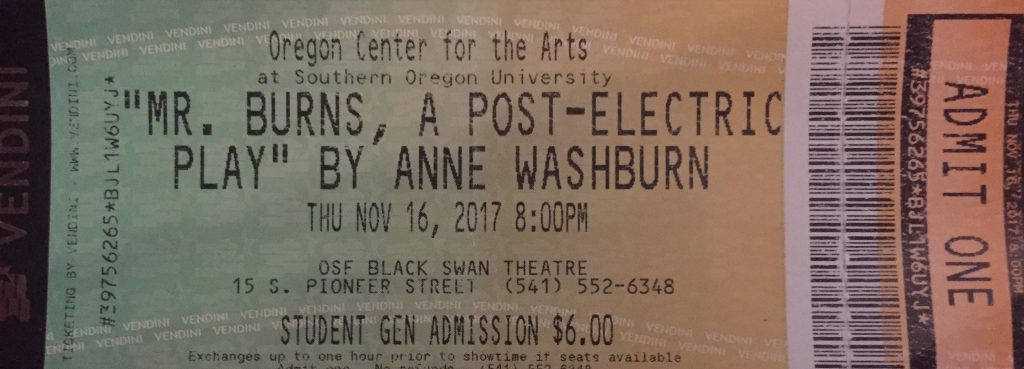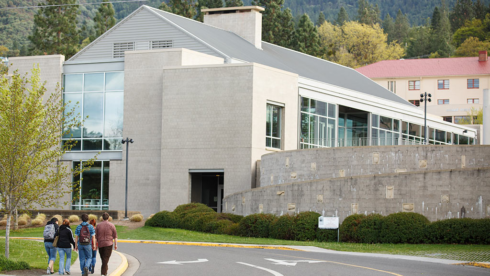 What follows is a review by student writer Darwin Garrett. The views do not represent the editorial opinions or content of The Siskiyou or Southern Oregon University.
What follows is a review by student writer Darwin Garrett. The views do not represent the editorial opinions or content of The Siskiyou or Southern Oregon University.
I am not opposed to reviews of Southern Oregon University (SOU) theater productions. To the contrary: more people should have the courage to share their thoughts on what they think and how they feel about plays. Theater should make you feel things, shouldn’t it? Constructive criticism should be welcome in the artistic community, but I found Siskiyou student-writer, Kyrie Hughes’ review lacking an attention to detail that makes the critique of a piece like “Mr .Burns: a Post-Electric Play” absent of real criticisms.
When I watched SOU’s production of “Mr. Burns,” I formed many opinions. This is natural: I am an opinionated person, particularly after a play. I am not impartial, I know many of the artists who worked on the “Mr. Burns.” Biases acknowledged, I believe Hughes’ review is ignorant of a nuanced and well-informed production.
Ultimately, Hughes is right: the audience did not receive a play-by-play of the lives and details of every single member of the group of survivors-turned-artists. But would you watch a play where every, excruciating, minutiae, is explained in agonizing detail? Washburn showed us what was important in the script, and left out what was not. What happened to the characters in the seven-year time skip wasn’t important. But the point of the second act: that theater was still alive and well in this post-electric world, was important.
A playwright never includes anything ‘meaningless’ in a production. Every anecdote had ideas about struggles in a post-apocalyptic world. Due to word count, I cannot go into exactly why I thought that Washburn included the anecdotes about men failing to save an un-salvageable world, or the bitter nostalgia of wanting something as simple as a Diet Coke– now only a memory. But if I did, I certainly would tell you why I cared about something ‘meaningless’ like Diet Cokes.
To say someone put a lot of work into a production is true, but hopefully redundant. What was impressive or creative about the devices? Be specific about the expressiveness of the costumes, and the intricate graffiti backdrop. Was it that Bart Simpson’s zig-zag hair crept into almost every set piece and costume? Or every unique missing poster in act three, that told their own story? Or the person who had the idea to line the concrete partitions with candles? Or whoever put a ridiculous variety of candles into a ridiculous variety of glass jars? It paid off, candle-person! It was visually striking!
“Mr. Burns” is an ensemble piece. Every actor in the first and second acts had a story to tell. From the young woman and her sick friend who became parents (Cameron Davis and Zoe Stadler), to the traumatized woman rising to the role of artistic-director (Aurelia Grierson), to the mysterious but benevolent ‘security chief’ and her buffoonish, heckling team (Meg Chambers, Nolan Sanchez, Josh Nile). I cannot give the whole cast the credit they deserve in this alone. Each person had a story that intersected and interacted with another fluidly and believably. I didn’t want to be told what happened in the seven year span, I wanted to be shown it. For the first half of the production, the cast did show me exactly who they were and what they’d been through.
The shift from the second to third act threw me for a loop in terms of narrative. It took me a while to readjust to the new dramatic, more theatrical style. A soundbite played between acts one and two: echoing whispers marking the passage of time that was absent at the beginning of the third. I did not register the immense passage of time, and the fact that all the characters that I knew from the previous acts were gone (except for the baby from act two, who I later assumed to be the old women that was a part of the company). The intermission with Itchy and Scratchy helped prepare me that something was different, but I needed more help to understand the amount of time passing and that we were fully in the story of “The Simpsons,” rather than watching a retelling or a rehearsal like acts one or two. I admit, I later learned that the information of the time skips was in the program, but I wish I had not needed to go to the program to understand what happened.
“Mr. Burns” is a bizarrely dark play about why we will always have need of theater and entertainment, especially when the world is dying around us. The only ‘chaos’ is if you’re not paying attention. If you watch the actors in any show, they should show you the story they want to tell. I believe these actors showed us that story.
You don’t have to like “Mr. Burns.” Tastes are tastes, sometimes a show makes you frustrated or disappointed. However, if you write a public review of a piece that only serves to discredit a production, you border on the distasteful.



